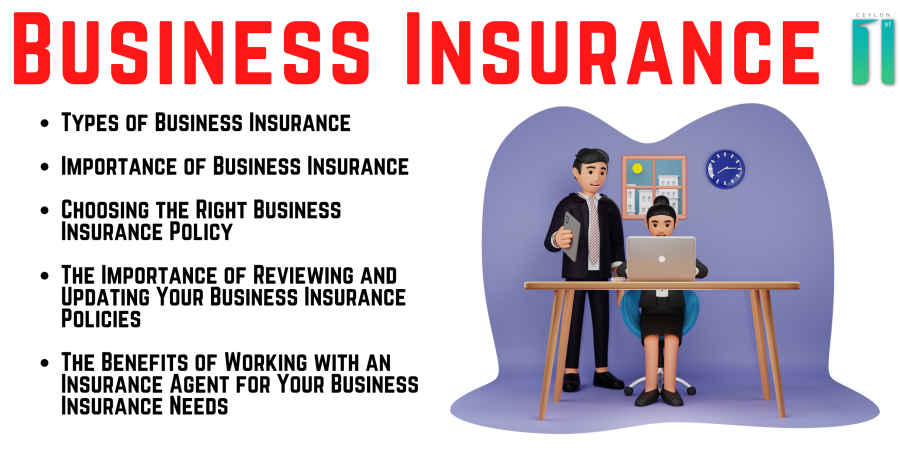Business insurance is a type of coverage designed to protect companies from potential financial losses due to unexpected events. There are various types of business insurance policies that cover different aspects of a business. Here are some of the most common
Types of business insurance policies:
1. General Liability Insurance: This type of insurance covers a business against third-party claims for bodily injury, property damage, and other types of damages caused by the company’s operations. It typically includes coverage for legal fees and settlements.
2. Property Insurance: This type of insurance covers a business’s physical assets such as buildings, equipment, inventory, and other property against loss or damage due to fire, theft, vandalism, or other events. It may also include coverage for business interruption.
3. Workers’ Compensation Insurance: This type of insurance covers employees who suffer work-related injuries or illnesses, providing them with medical benefits and lost wages. It also protects the employer from potential lawsuits related to workplace injuries.
4. Business Interruption Insurance: This type of insurance covers a business for losses caused by the temporary shutdown of operations due to unforeseen events such as fire, natural disasters, or other covered perils. It typically covers lost profits, fixed expenses, and other costs associated with the interruption.
5. Professional Liability Insurance: This type of insurance, also known as errors and omissions insurance, protects businesses that provide professional services from claims of negligence or mistakes. It typically covers legal fees and settlements.
6. Cyber Liability Insurance: This type of insurance protects businesses from losses due to cyber-attacks, data breaches, and other types of cyber threats. It typically covers costs associated with data recovery, liability claims, and regulatory fines.
7. Directors and Officers Liability Insurance: This type of insurance protects the directors and officers of a company from personal liability for their decisions and actions on behalf of
the company. It typically covers legal fees and settlements.
Choosing the right type of business insurance depends on a variety of factors, including the type of business, the industry, and the potential risks involved. It’s important to work with an insurance professional who can help you identify the risks and recommend the right type of coverage for your business.
Importance of Business Insurance
Starting and running a business is an exciting and fulfilling endeavour, but it also comes with a great deal of risk. No matter how small or large your business may be, there are always potential hazards that could cause financial harm, and that’s where business insurance comes in. Business insurance is designed to protect businesses against unexpected events, accidents, and other liabilities that could result in financial loss. Here are some reasons why business insurance is essential for businesses of all sizes.
1. Legal Requirements
Depending on the state, certain types of business insurance may be required by law. For example, most states require businesses with employees to carry workers’ compensation insurance. Failure to carry required insurance can result in hefty fines, legal fees, and other penalties. In addition to legal requirements, some customers and clients may require proof of insurance before doing business with a company, so carrying adequate insurance can be a necessary part of doing business.
2. Protects Business Assets
One of the most important reasons to carry business insurance is to protect your company’s assets. This includes physical property such as buildings, equipment, and inventory, as well as intangible assets such as intellectual property and reputation. With the right insurance coverage, your business can be protected against losses due to theft, vandalism, fire, and other unforeseen events. For example, property insurance can cover the cost of repairing or replacing damaged property, while liability insurance can help cover legal fees and settlements in the event of a lawsuit.
3. Protects Business Reputation
In addition to protecting physical assets, business insurance can also protect a company’s reputation. A single accident or mistake can lead to a damaging lawsuit or negative publicity, which can hurt a business’s reputation and bottom line. With the right insurance coverage, a business can mitigate these risks and respond quickly and effectively to crises. For example, a general liability insurance policy can cover the cost of legal fees and settlements related to bodily injury or property damage, while professional liability insurance can protect against claims of negligence or malpractice.
4. Provides Peace of Mind
Running a business can be stressful and unpredictable, but carrying business insurance can provide peace of mind knowing that your company is protected against potential losses. With the right coverage, you can focus on growing your business and serving your customers, rather than worrying about the what-ifs. Business insurance can provide protection against risks that are out of your control, such as natural disasters, cyber attacks, and accidents, allowing you to focus on what you do best.
5. Attracts and Retains Employees
In addition to protecting your company’s assets and reputation, business insurance can also attract and retain employees. Offering competitive benefits, including health insurance, workers’ compensation, and other forms of insurance, can help attract top talent and keep employees loyal to your company. In addition, carrying workers’ compensation insurance can help protect your business against lawsuits related to workplace injuries, and can provide injured employees with the medical care and lost wages they need to recover.
business insurance is an essential component of any successful business strategy. It provides protection against unforeseen events and liabilities that could result in financial harm, and can help protect a company’s assets and reputation. By working with an experienced insurance professional, you can identify the risks that are unique to your business and choose the right coverage to meet your needs. In the end, investing in business insurance is an investment in the long-term success and stability of your company.
Choosing the Right Business Insurance Policy
Choosing the right business insurance policy can be a daunting task, especially for small business owners who are already juggling a variety of responsibilities. However, selecting the right coverage is essential to protecting your business from potential financial losses. Here are some tips to help you choose the right business insurance policy.
1. Assess Your Risks
The first step in choosing the right business insurance policy is to assess the risks associated with your business. This includes identifying potential hazards and liabilities, such as property damage, theft, employee injuries, and customer lawsuits. By understanding the risks unique to your business, you can choose the appropriate insurance policies to protect against these potential losses.
2. Research Coverage Options
Once you’ve assessed your risks, it’s important to research the various types of insurance coverage available. There are many different types of business insurance policies, such as general liability, property, workers’ compensation, professional liability, cyber liability, and more. Each type of policy offers different levels of protection, so it’s important to understand what each policy covers and how it can benefit your business.
3. Consult with an Insurance Professional
Choosing the right business insurance policy can be overwhelming, so it’s important to consult with an insurance professional who can help guide you through the process. An experienced insurance agent can help you assess your risks, understand your coverage options, and choose the policies that are right for your business. They can also help you determine the appropriate coverage amounts and deductibles based on your budget and risk tolerance.
4. Compare Quotes
Once you’ve identified the types of coverage you need, it’s important to compare quotes from different insurance providers. Different insurers may offer different rates for the same coverage, so it’s important to shop around to find the best deal. However, it’s important to remember that the cheapest policy may not always be the best choice. Be sure to compare the coverage limits, deductibles, and exclusions of each policy to determine the overall value.
5. Review and Update Your Policies Regularly
Businesses are dynamic and constantly evolving, which means your insurance needs may change over time. It’s important to review your insurance policies regularly to ensure that they still meet your business’s needs. This may include updating coverage amounts, adding or removing policies, or switching insurance providers. Regularly reviewing your policies can help you stay protected against new risks and ensure that you have adequate coverage in the event of a loss.
In conclusion, choosing the right business insurance policy is an important part of protecting your business from potential financial losses. By assessing your risks, researching coverage options, consulting with an insurance professional, comparing quotes, and regularly reviewing your policies, you can ensure that your business has the coverage it needs to thrive. Investing in the right insurance policies can provide peace of mind and help you focus on growing your business with confidence.
The Importance of Reviewing and Updating Your Business Insurance Policies
As a small business owner, it’s essential to have the right insurance coverage to protect your business from potential financial losses. However, simply purchasing insurance policies isn’t enough. It’s important to regularly review and update your insurance policies to ensure that they continue to meet the changing needs of your business. Here are some reasons why reviewing and updating your business insurance policies is crucial.
Changes in Business Operations
As your business grows and evolves, the nature of your operations may change. For example, you may expand your product line, hire more employees, or move to a new location. These changes can impact the types of insurance coverage you need. By regularly reviewing your insurance policies, you can ensure that they continue to provide the appropriate coverage for your business operations.
Changes in Industry Regulations
Industry regulations can change over time, which can impact the types of insurance coverage you need. For example, if you operate a healthcare business, you may need to update your insurance policies to comply with new regulations related to patient privacy or data security. Staying up-to-date with industry regulations and reviewing your insurance policies regularly can help ensure that your business is in compliance and adequately protected.
Changes in Business Assets
Your business assets, such as equipment, inventory, and property, may change over time. It’s important to regularly review your insurance policies to ensure that they provide adequate coverage for your current assets. For example, if you purchase new equipment, you may need to update your property insurance policy to reflect the increased value of your assets.
Changes in Liability Risks
Liability risks can change over time as your business operations and industry regulations change. By reviewing your insurance policies regularly, you can ensure that you have the appropriate liability coverage to protect your business from potential legal and financial damages. For example, if you expand your product line, you may need to update your product liability insurance policy to reflect the increased risk of product-related claims.
Changes in Budget and Cost of Coverage
As your business grows and evolves, your budget and cost of coverage may also change. Regularly reviewing your insurance policies can help ensure that you are getting the best value for your insurance coverage. Comparing quotes from different insurance providers can help you find the best coverage at a price that works for your business.
In conclusion, reviewing and updating your business insurance policies is crucial to ensuring that your business is adequately protected from potential financial losses. By staying up-to-date with changes in your business operations, industry regulations, assets, liability risks, and budget, you can make informed decisions about your insurance coverage and ensure that you have the appropriate protection for your business. Don’t wait until it’s too late – make reviewing and updating your insurance policies a regular part of your business operations.
The Benefits of Working with an Insurance Agent for Your Business Insurance Needs
As a small business owner, you have a lot on your plate, and choosing the right insurance coverage for your business can be overwhelming. That’s where working with an insurance agent can be a valuable resource. Here are some benefits of working with an insurance agent for your business insurance needs.
Expertise and Knowledge
Insurance agents are experts in their field and have extensive knowledge of insurance products and services. They can help you navigate the complex world of business insurance and identify the coverage options that are best suited for your business needs. By working with an insurance agent, you can have peace of mind knowing that you have the right insurance coverage in place to protect your business.
Tailored Insurance Coverage
One of the biggest advantages of working with an insurance agent is the ability to receive tailored insurance coverage that meets the unique needs of your business. Insurance agents work with a variety of insurance providers and can compare coverage options to find the policy that best fits your specific business needs. This tailored approach ensures that you have the coverage you need to protect your business, without paying for coverage you don’t need.
Save Time and Money
Shopping for business insurance can be time-consuming, and it’s easy to get overwhelmed with the number of coverage options available. Working with an insurance agent can save you time by streamlining the process and presenting you with the best coverage options for your business. Additionally, agents can help you find discounts and savings opportunities that you may not have been aware of, potentially saving you money in the long run.
Assistance with Claims
In the event of a loss or damage to your business, filing an insurance claim can be a complicated and stressful process. An insurance agent can be a valuable resource in assisting you with the claims process and ensuring that you receive the full benefits of your insurance policy. With an agent by your side, you can have peace of mind knowing that you have the support you need during a difficult time.
Personalised Service
Insurance agents pride themselves on providing personalised service to their clients. They work closely with you to understand your unique business needs and tailor insurance coverage that meets those needs. Additionally, agents can provide ongoing support throughout the life of your policy, answering any questions you may have and providing guidance as your business needs change.
Working with an insurance agent can be a valuable resource for small business owners looking to protect their business with the right insurance coverage. With their expertise and knowledge, agents can help you navigate the complex world of insurance and identify the coverage options that are best suited for your business needs. By providing tailored insurance coverage, saving you time and money, assisting with claims, and offering personalised service, an insurance agent can be a valuable partner in protecting your business. Contact an insurance agent today to learn more about the benefits of working with an agent for your business insurance needs.
CEYLON FIRST



Leave feedback about this